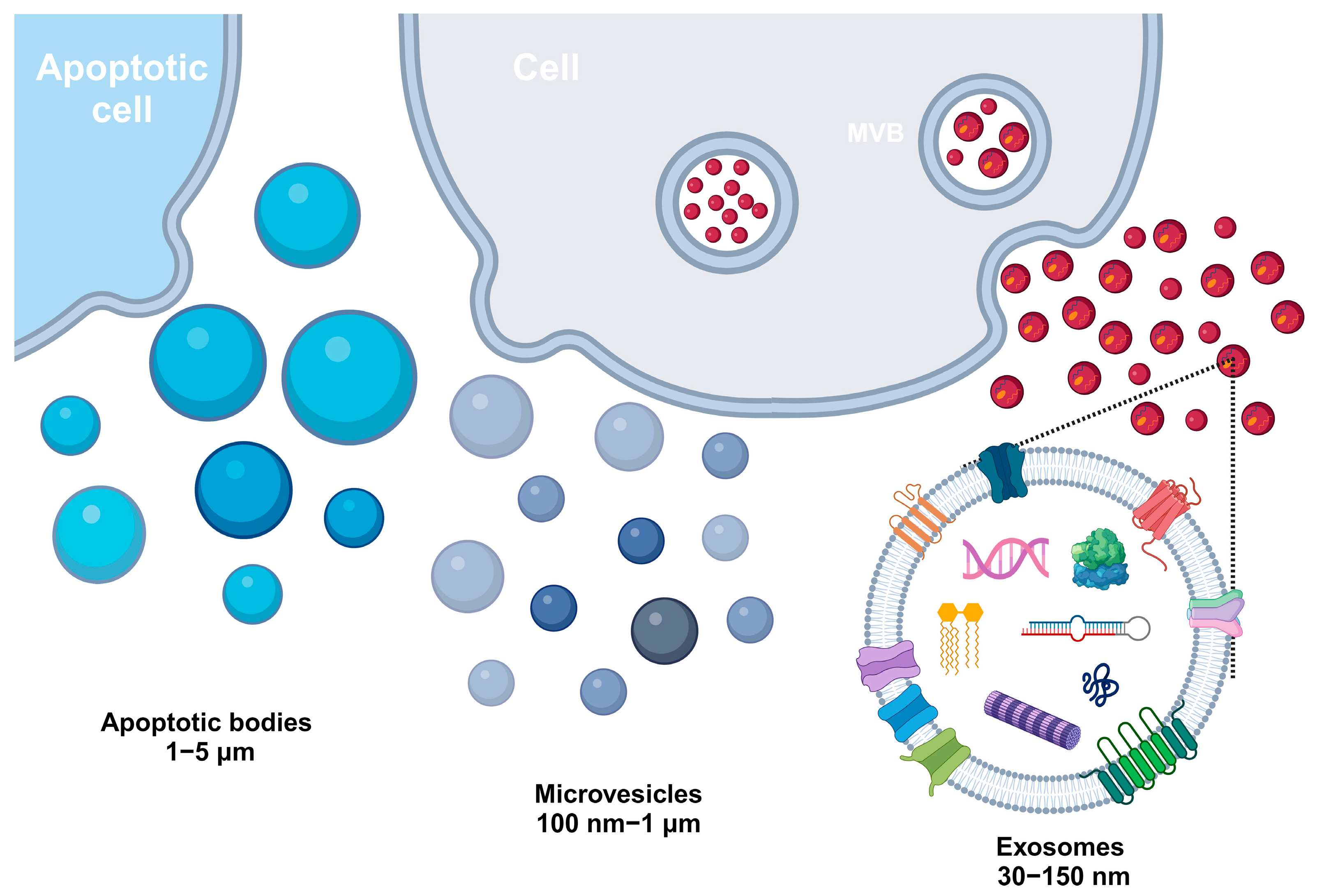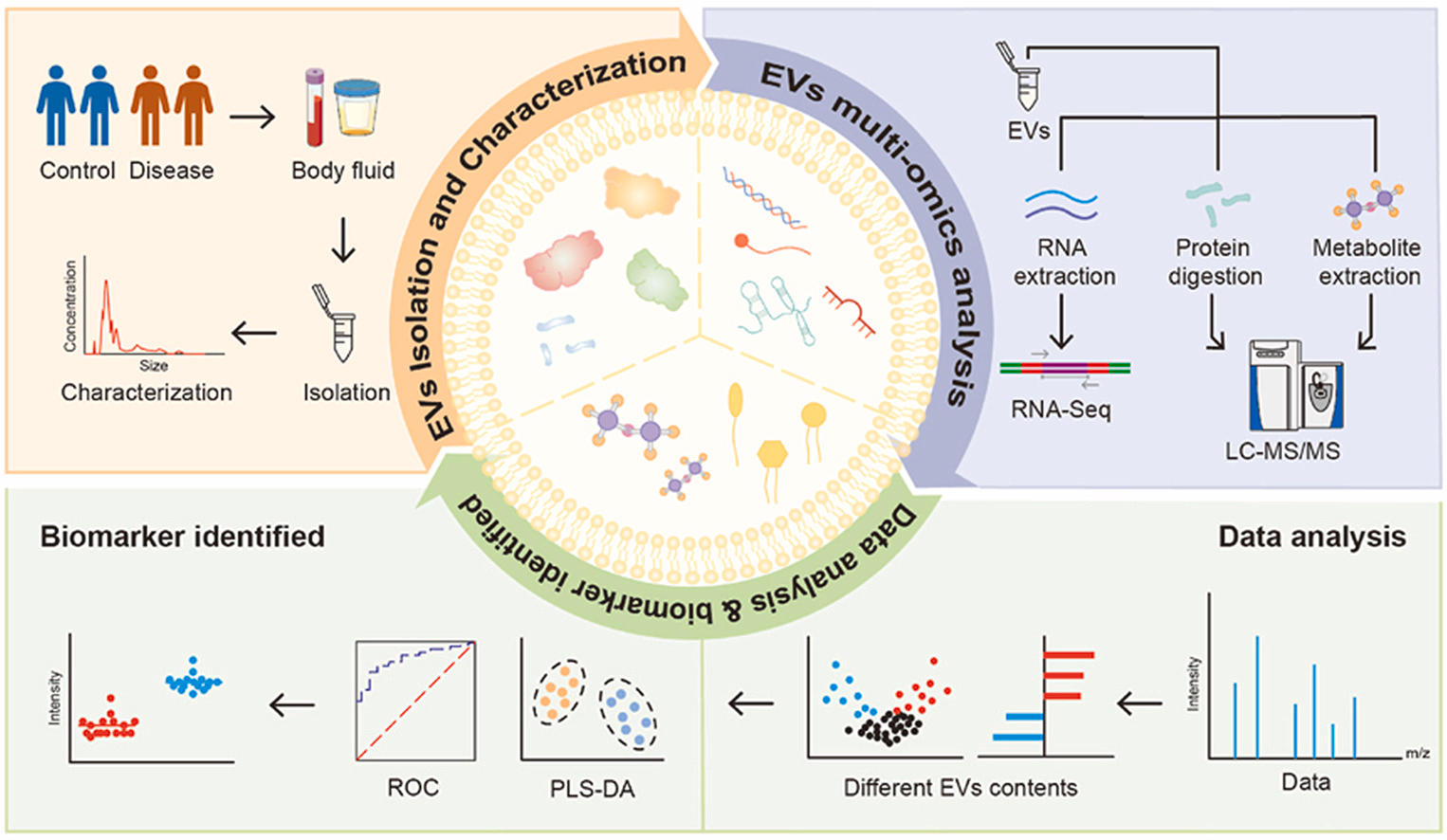Extracellular Vesicles Analysis Services
- Disease Mechanism Studies: Uncover the regulatory roles of EVs in cancer, neurodegenerative diseases, cardiovascular conditions, diabetes, and autoimmune disorders, aiding in target identification and validation.
- Clinical Diagnostics and Liquid Biopsy: Analyze EV-derived biomarkers from bodily fluids for early diagnosis, disease monitoring, and longitudinal precision medicine.
- Drug Discovery and Delivery Engineering: Investigate pharmacodynamic pathways and develop EV-based carriers for RNA, proteins, or small molecules.
- Stem Cell and Regenerative Medicine: Explore the immunomodulatory and reparative capacities of stem cell-derived EVs for use in acellular therapy and tissue regeneration.
- Microbial and Plant EV Research: Study non-animal EVs in antigen presentation, interspecies signaling, and agricultural biocontrol strategies.
Extracellular vesicles (EVs) are lipid bilayer-enclosed nanostructures actively secreted by cells in both resting and stimulated states. Primarily originating from eukaryotic cells—with analogous vesicles observed in prokaryotes—EVs serve as essential vehicles for intercellular communication. Based on their biogenesis, size, and function, EVs are broadly classified into exosomes, microvesicles, and apoptotic bodies.

Stawarska, A. et al. Int. J. Mol. Sci. 2024.
EVs are present in diverse biological fluids—including blood, urine, saliva, breast milk, amniotic fluid, cerebrospinal fluid, and synovial fluid—making them ideal candidates for liquid biopsy and longitudinal disease monitoring. These vesicles encapsulate a wide array of biomolecules, including proteins, lipids, metabolites, and various nucleic acids (e.g., miRNA, lncRNA, mRNA, cfDNA), enabling them to profoundly influence physiological and pathological pathways in both donor and recipient cells. With growing insight into their molecular cargo and functions, EVs are now widely applied in biomarker discovery, therapeutic target identification, and drug delivery system engineering.
MtoZ Biolabs offers comprehensive, customizable Extracellular Vesicles Analysis Services powered by high-resolution mass spectrometry and multi-omics integration. We support academic and industrial clients in systematically exploring the biological significance and translational potential of EVs.
Services at MtoZ Biolabs
MtoZ Biolabs delivers end-to-end Extracellular Vesicles Analysis Services that provide flexible solutions from EV isolation to multi-layered omics analysis. Our services are fully adaptable to various sample types and research goals, including:
· EV Isolation and Purification
Utilizing a tailored combination of differential centrifugation, density gradient ultracentrifugation, immunoaffinity capture, nanomaterial-based enrichment, and microfluidic technologies, we select the optimal strategy to preserve EV purity and structural integrity across sample types.
· Morphological and Purity Assessment
Using transmission electron microscopy (TEM), nanoparticle tracking analysis (NTA), and flow cytometry, we evaluate particle size, morphology, and marker expression to ensure quality control prior to downstream applications.
Comprehensive profiling includes membrane markers (e.g., CD9, CD63, integrins, selectins), intravesicular proteins (e.g., TSG101, ALIX, Rab GTPases, HSPs, metabolic enzymes), discovery of novel proteins, differential expression analysis, and protein–protein interaction (PPI) network mapping.
High-resolution LC-MS enables qualitative and quantitative analysis of EV-associated metabolites, supporting pathway enrichment, biomarker discovery, and metabolic function elucidation.
· EV Lipidomics
We offer detailed lipid profiling, including fatty acid composition, lipid subclass quantification, and differential abundance analysis, providing crucial insights into lipid metabolism and disease-associated remodeling.
Analysis Workflow
1. Sample Evaluation and Strategy Design
Customized protocols are developed based on sample type, source, and research objectives to ensure optimal EV recovery and data compatibility.
2. EV Isolation and Quality Control
Isolation is performed using the most appropriate technique, with embedded QC steps to verify yield, structural integrity, and purity.
3. Characterization of Vesicle Morphology and Markers
Size distribution and vesicle structure are assessed using TEM and NTA, while surface markers are validated by Western blot or flow cytometry.
4. Multi-Omics Extraction and Platform-Based Detection
Based on project needs, we extract proteins, lipids, metabolites, or nucleic acids and perform analysis via LC-MS, GC-MS, qPCR, or high-throughput sequencing platforms.
5. Data Analysis and Report Generation
We conduct statistical modeling, pathway enrichment, and network analysis, delivering detailed, visually enriched reports ready for publication or regulatory submission.

Meng, K. et al. Talanta. 2024.
Figure 1. Workflow of Extracellular Vesicles Multi-Omics Analysis
Why Choose MtoZ Biolabs?
✔ Broad Sample Compatibility: Supports analysis of serum, plasma, urine, cerebrospinal fluid, cell culture supernatant, and tissue homogenates, suitable for both research and clinical-grade studies.
✔ Versatile Isolation Techniques: Offers ultracentrifugation, membrane filtration, polymer-based precipitation, and immunomagnetic bead enrichment to accommodate diverse downstream applications.
✔ Advanced Analysis Platform: Equipped with Thermo Fisher Orbitrap Fusion, Q Exactive HF, and Agilent Q-TOF systems to ensure sensitive detection of low-abundance vesicular components.
✔ Multi-Omics Integration: Enables cross-layered insights by combining proteomics, transcriptomics (miRNA, lncRNA, circRNA), metabolomics, and lipidomics.
✔ Fully Customized Project Support: From study design and experimental execution to data interpretation, we offer fully personalized, one-stop solutions to meet specific research and development needs.
✔ One-Time-Charge: Our pricing is transparent, no hidden fees or additional costs.
Applications
MtoZ Biolabs’ Extracellular Vesicles Analysis Services are suited for a wide range of biological and translational research applications:
FAQ
Q1: Does MtoZ Biolabs support multi-omics integration for EV analysis?
Absolutely. Our EV analysis platform integrates proteomics, metabolomics, lipidomics, and transcriptomics (e.g., miRNA) to deliver a systems-level view of extracellular vesicle biology. This approach is ideal for biomarker discovery, mechanism research, and functional validation.
Q2: Can novel proteins in EVs be identified and functionally annotated?
Yes. We provide full-spectrum proteomic analysis, including identification of unannotated proteins through de novo sequencing and homology-based annotation. Functional prediction is supported via GO/KEGG enrichment, PPI network modeling, and cross-omics integration to explore regulatory mechanisms.
What Could be Included in the Report?
1. Documented experimental protocols and quality control reports
2. TEM/NTA images and morphological evaluation summaries
3. Quantitative data matrices for proteins, metabolites, and lipids
4. Multi-omics bioinformatics reports including statistical modeling, enrichment, and network analysis
5. Visual data outputs (PCA plots, volcano plots, GO/KEGG pathway maps, etc.)
6. Raw data files (.raw, .mzML, .fasta, etc.) compatible with major analysis platforms
Whether you are investigating EV roles in disease, developing diagnostics, or engineering therapeutic vectors, MtoZ Biolabs delivers expert-driven, high-precision Extracellular Vesicles Analysis Services. Contact us for tailored consultation and start your extracellular vesicle research with a trusted partner.
Related Services
Mitochondrial Analysis Services
How to order?







